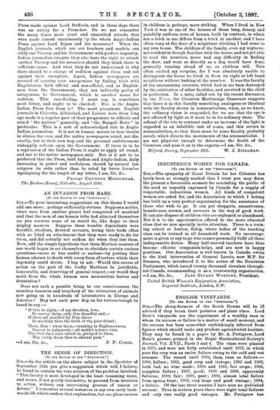THE SENSE OF DIRECTION.
[To THE EDITOR OP THE " SPECTATOR."]
SIR,—In the article on the above subject in the Spectator of September 25th you give a suggestion which will, I believe, be found to contain the true solution of the problem involved. "This faculty is most developed in the least reasoning races, and seems, if not purely instinctive, to proceed from intuition to action, without any intervening process of reason or debate." I remember several instances in my own early back. woods life which confirm that explanation, but one phenomenon in children is, perhaps, more striking. When I lived in New York it was in one of the houses of those long, dreary, and! painfully uniform rows of houses, built by contract, in which not a brick in one differs from a brick in another, and I have often rung at the door of a neighbour thinking I had come to my own house. The children of the family, even my nephews, not resident in though familiar with the house, and not yet able to read the numbers, never had any difficulty in finding the door, and went as directly as a dog would have done, generally running ahead of us, as children will. This often excited my surprise, for I was absolutely unable to distinguish the house we lived in from its right or left hand neighbour without looking at the number. It was the faculty of the unreasoning creature, which had in me been destroyed by the cultivation of other faculties, and survived in the child in perfection. In a note, called out by the recent discussion in the Times, the Countess Martinengo Cesaresco suggests that there is in this faculty something analogous or identical with the faculty shown in somnambulism, when, as we know, the ordinary vision is suspended, for we see that the eye is not affected by light as it must be in its ordinary state. The refusal of the iris to contract under an increase of the light is regarded as an infallible test of coma, and this occurs in somnambulism, so that there must be some faculty, probably occult, which directs the movements of the somnambulist. I am not physicist enough to determine the doubt of the Countess, and pass it on to the experts.—I am, Sir, Sta., Milford, Surrey, September 28th. W. J. STILLMAN.






































 Previous page
Previous page